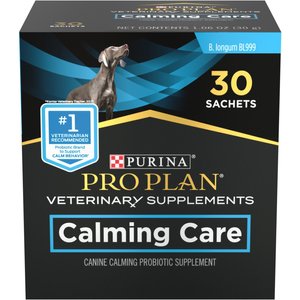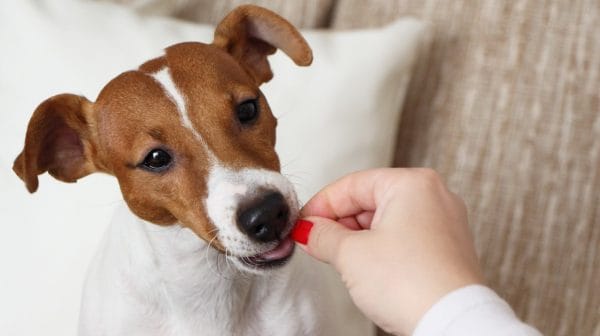Probiotic supplements can be helpful for humans, but did you know that many dogs can benefit from probiotics too? It’s true. Healthy bacteria are a necessity in a dog’s gut, or digestive tract, and thanks to a growing awareness of the benefits of probiotics for dogs, we can easily deliver billions of bacteria to our four-legged friends.
We talked to vets to get the lowdown on probiotics for dogs, so you can determine whether these magical microscopic bacteria could help your pooch, learn about the different types of probiotics available for dogs and more.
In This Guide:
What Are Probiotics for Dogs?
When we think of bacteria, we don’t always assume they’re beneficial for the body. We tend to think of bacteria as harmful invaders that need to be eliminated. However, when it comes to the digestive system, not all bacteria are bad. In fact, many types are necessary. Just as is the case with humans, your dog needs good bacteria in their gut to maintain their digestive health as well as their overall health.
“Probiotics are essentially good bacteria living in the gut,” says Dwight Alleyne, DVM, a practicing veterinarian in Georgia. They are helpful microorganisms composed of bacteria and yeast, and a dog’s digestive system contains billions of them (yes, billions!).
If your dog’s natural gut bacteria are imbalanced—a situation that occurs when the proportion of harmful bacteria to beneficial bacteria is too high—probiotic dog supplements may help your pup establish and maintain a healthy gut microbiome (environment of microorganisms). Of course, you should always check with your vet to ensure probiotics are a good fit for your furry friend.
What Are Prebiotics for Dogs? What’s the Difference?
While probiotics are the actual bacteria, prebiotics are the food source for probiotics.
“Prebiotics are fibers that are non-digestible and provide nutrition to the good bacteria in the intestines,” says Dr. Alleyne.
Taking a supplement that also contains prebiotics can be helpful, but it’s not an absolute necessity for probiotic supplements to be successful.
5 Types of Probiotics for Dogs
Probiotics for dogs come in several forms:
- Probiotic powder can be sprinkled on top of or mixed into your dog’s food.
- Probiotic capsules, such as the Proviable supplements, can be given like a pill or opened up and added to your dog’s food, just like you’d do with powders.
- Probiotic chews are little, flavored treats for your pooch, only the benefits go far beyond the taste, because they’re packed with beneficial probiotics.
- Dog foods with probiotics, such as Purina Pro Plan Complete Essentials, deliver probiotics in pets’ regular meals.
- Probiotic gel, like Bene-Bac digestive supplement, contains live probiotics and can be a good option for newborn and young puppies.
Benefits of Probiotics for Dogs
Probiotics can contribute to a dog’s well-being because they can help with the following:
- Improve digestive health
- Support the immune system
- Support nutrient absorption
- Reduce allergies, such as food allergies and skin allergies, as well as allergic reactions
- Help reduce the severity of occasional diarrhea under some circumstances, such as when caused by diet change, stress or antibiotic use
- Alleviate symptoms of gastrointestinal disease
- Improve bad breath
Research shows that probiotics can even benefit a dog’s mental health. A 2016 study found that when anxious dogs were given a particular probiotic, Bifidobacterium longum, 90% engaged in fewer anxious behaviors—such as barking, jumping, spinning and pacing—in response to daily stimuli, and 75% experienced decreased heart rates when exposed to stress-inducing stimuli. The Purina Pro Plan Veterinary Supplements Calming Care, for example, contains Bifidobacterium longum.
It’s pretty cool that a bunch of bacteria can benefit our four-legged friends in so many ways.
Downsides of Probiotics for Dogs
Probiotics can cause side effects in some dogs. It’s possible that the side effects may get worse and then improve. If you notice any of the following after giving your dog a probiotic supplement, talk to your vet:
- Bloating
- Diarrhea
- Digestive discomfort
- Constipation
- Gas
How To Choose the Best Probiotic for Your Dog
When it comes to choosing the best probiotic for your dog, consider these steps:
1. Talk to Your Vet
Speaking with your vet is the first—and most important—step to take.
“They’ll know your dog’s health history and can [tell you] if probiotics could help,” says Sara Ochoa, DVM, a veterinarian at Animal Hospital of West Monroe in West Monroe, Louisiana.
Dr. Ochoa recommends asking your vet which strains of probiotics are best. Cornell College of Veterinary Medicine considers the following strains of probiotics beneficial to dogs:
- Bacillus coagulans
- Bifidobacterium animalis
- Bifidobacterium bifidum
- Bifidobacterium longum
- Enterococcus faecium
- Lactobacillus acidophilus
- Lactobacillus casei
- Lactobacillus plantarum
- Lactobacillus rhamnosus
2. Choose a Probiotic Designed for Dogs
It’s important to choose probiotics specifically designed for dogs, Dr. Alleyne says, because a dog’s digestive system doesn’t contain all the same bacteria as a human’s does. While a probiotic for humans won’t harm your dog, it also won’t help them as much as a probiotic that’s formulated for dogs will.
3. Do Your Homework
Select a probiotic for dogs that has a good reputation and is of good quality, says Dr. Alleyne.
Vets recommend probiotic products that have demonstrated their safety and efficacy with research studies and clinical testing. Also, checking the ratings and reading product reviews for the digestive supplements you’re considering is a great way to learn from other pet parents more about how well a probiotic performs.
4. Check the Bacterial Counts (CFUs)
Dr. Alleyne recommends pet parents choose a probiotic supplement with reliable bacterial counts, or CFUs.
CFU stands for “colony-forming units,” which is a measurement that estimates the number of bacteria present.
According to Cornell College of Veterinary Medicine, the current recommendation for dogs is between 1 billion and 10 billion CFUs per day.
FAQs About Probiotics and Dogs
Q:How do I know if my dog needs a probiotic?
A:Dr. Alleyne says your dog may need probiotics if they experience any of the following issues:
- Intermittent or consistent diarrhea
- Constipation
- Frequent gastrointestinal upset
Q:Can probiotics help with my dog’s skin allergies?
A:Yes, using probiotics for allergies in dogs can be effective. They may help with a dog’s skin allergies, because probiotics can help support the immune system and promote a normal inflammation response, which may alleviate some of the skin symptoms associated with seasonal allergies, says Dr. Alleyne.
Q:Can probiotics improve my dog’s skin and coat health?
A:Probiotics may indirectly improve a dog’s skin and coat health because they “can help support nutrient absorption by the gastrointestinal system,” says Dr. Alleyne.
Q:Can dogs have human probiotics?
A:Although human probiotics won’t harm your dog, they won’t be as effective as dog probiotics, says Dr. Alleyne. Human probiotics “are not formulated to address dog-specific bacterial strains,” he says.
Q:How long does it take for probiotics to work in dogs?
A:The length of time it takes for probiotics to begin working will depend on the severity of the signs and the specific cause of the gastrointestinal upset, says Dr. Alleyne. “It can be as soon as a few days to as long as a few weeks,” he adds.
Q:Can dogs have human foods with probiotics, like yogurt? If so, which ones and how much?
A:Yes, dogs can have certain human foods with probiotics, such as “a smear of plain yogurt, ricotta or cottage cheese,” says Karen Shaw Becker, DVM, a veterinarian in private telehealth practice in Chicago and co-author of the book “The Forever Dog Life.”
Dr. Alleyne cautions pet parents to ensure the yogurt or other human food doesn’t contain artificial sweeteners like xylitol, which is highly toxic to dogs. Also, if you suspect your dog has a lactose issue, refrain from giving any yogurt of any kind and in any amount until you consult with your vet.
Q:Can I use probiotics for diarrhea in dogs?
A:Yes, probiotics can help your dog if they’re experiencing diarrhea or loose stools from a variety of issues, including bacterial infections, antibiotic use, stress or changes in diet. If the dog is currently taking antibiotics, the probiotics will be more effective if they are given separately a few hours after antibiotic administration.
Q:Is it safe to use probiotics for puppies?
A:Yes, some probiotics are safe for puppies. Be certain to read the labels to ensure they’re puppy-safe, and always check with your vet first.
As pet parents, we want happy, healthy dogs—and probiotics for dogs can be a fantastic way to ensure good overall health and wellness for our four-legged friends. Next, learn all about the many benefits—including better gut health—of serving your dog bone broth.
Expert input provided by Dwight Alleyne, DVM, a practicing veterinarian in Georgia; Karen Shaw Becker, DVM, a veterinarian in private telehealth practice in Chicago and co-author of the book “The Forever Dog Life”; and Sara Ochoa, DVM, a veterinarian at Animal Hospital of West Monroe in West Monroe, Louisiana.
This content was medically reviewed by Chewy vets.
More about dog nutrition:
Share:















